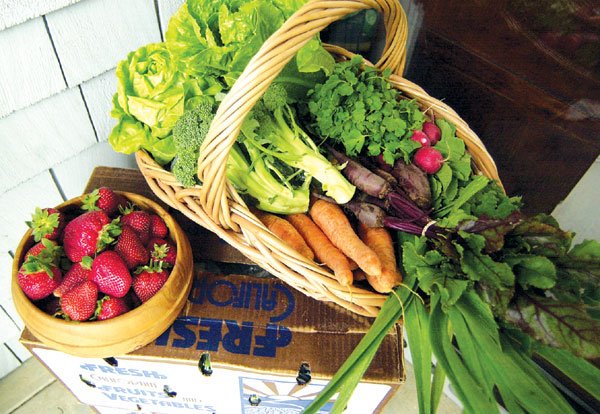Becky Herbert’s family has been farming the land in and around
Hollister as long as the town has existed, but the
fourth-generation farmer and her partner Bryan Proehl are bringing
the family’s wares to dinner tables all over the greater San
Francisco Bay region in a novel way with Herbert Organic CSA.
Becky Herbert’s family has been farming the land in and around Hollister as long as the town has existed, but the fourth-generation farmer and her partner Bryan Proehl are bringing the family’s wares to dinner tables all over the greater San Francisco Bay region in a novel way with Herbert Organic CSA.
Herbert participates in what is known as community-supported agriculture – a movement that helps keep small farms afloat in a corporate farm era by linking growers and consumers in a direct produce exchange. Think of it, supporters say, as produce by subscription.
The process works by cutting out the middle man. Instead of selling her wares to a wholesaler, Herbert and Proehl make home deliveries or drop off batches of produce at pick-up points from Prunedale to San Francisco. She deals directly with her 150 or so customers, each of whom pays $16 to $32 per week for the chance to pick from a variety of seasonal, organic wares like lettuce, broccoli, celery and organic strawberries.
“I think it really encourages people to eat healthy and pay attention to what they’re eating,” said Herbert. “It also brings community together because we share recipes through our newsletter. I also feature farm updates about what’s going on in the field, and my partner draws pictures of the farm in charcoal that I put in.”
Since Herbert started the CSA farm in 2000, her subscription rate has doubled nearly every year, and that’s good news for her and other small farmers in the area.
“I think it’s one of the only ways you can continue as a small farm today,” said Tom Broz, owner of Live Earth Farm in Watsonville, which delivers produce to pick-up points in Hollister, Gilroy and Morgan Hill on Thursdays from late spring through the fall.
Small farmers need the stability a CSA program can provide, said Broz. Instead of guessing at the number of vegetables they’ll sell at a farmer’s market, farmers who participate in these programs can get a much more solid estimate of demand based on yearly subscription fees.
To help customers feel more connected to the community and the land their vegetables and fruits come from, Broz hosts a variety of seasonal mixers, where consumers and farmers can gather for pot lucks and recipe exchanges that go beyond the farm’s monthly newsletter.
There is also a children’s mini-camp and an internship program for farmers and agricultural enthusiasts who want to learn organic practices.
Unlike Herbert’s farm, most CSAs do not allow subscribers to pick their items. Instead, growers deliver a seasonal box containing whatever is freshest from a wide variety of cultivated products. Overwhelming for some, loyal CSA members take the ever-changing mix as a challenge.
“I had to learn how to use some new vegetables that I probably wouldn’t have even paid attention to if I’d seen them in the grocery store,” said Heidi Collier, a Gilroy-based homemaker who has belonged to one CSA or another for the last 10 years. “The first CSA we belonged to had a lot of eggplant. I’d never really cooked with eggplant before, but now I love to have some nice grilled, marinated eggplant on my sandwich.”
Collier has also experimented with cooking fava beans, Swiss chard and beets, all because they showed up in her produce basket for the week.
“In terms of just sort of trying to find out what to do with beets, for example, our newsletter for the CSA has a section called ‘What I’d do with this week’s box,'” said Collier. “When people sit down and write up what they’d do, they just seem so organized and competent, but I think I’ve become more experimental. I haven’t become a gourmet cook or anything, but I’m better.”
Collier has discovered her taste for beet green salad with raspberry vinaigrette and Swiss chard fritatta, but some things she prefers to leave unchanged.
“We usually get the strawberries this time of year, and I don’t really like to do anything with them other than clean them, slice them and eat them up,” said Collier, who said she prefers her CSA produce not only because of its freshness, but because all of it is organic.
“Getting the fruit as fresh as picked the day you get the box is great, but there isn’t that added pesticide taste, either, and I know it’s healthier,” she said.
It’s a sentiment shared by most CSA buyers, according to Julia Wiley, owner of Mariquita Farm in Watsonville and Hollister with husband Andy Griffin. The pair partners with a Watsonville farm called High Ground Organics to provide buyers with a wider variety of warm and cool-weather produce throughout the growing season, said Wiley.
Wiley has found most of her customers to be middle-class working people who either cannot or do not want to go to events like farmers’ markets.
The CSA attracts customers with similar values as her farmer’s market customers, but crossover between the two types is minimal, further adding to the stability of Wiley’s bottom line.
Most CSA farms deliver their produce goods between late spring and mid to late fall for a weekly fee.
Local CSA Farms
• Herbert Family CSA
Hollister
(831) 637-9571
www.HerbertFamilyFarm.com
• Mariquita Farm
Hollister, Watsonville
(831) 761-3226
www.Mariquita.com
• High Ground Organics
Watsonville
(831) 786-0286
www.HighGroundOrganics.com
• Live Earth Farm
Watsonville
(831) 763-2448
www.LiveEarthFarm.com
For more information on community-supported agriculture, visit www.LocalHarvest.org or www.CSACenter.org.














